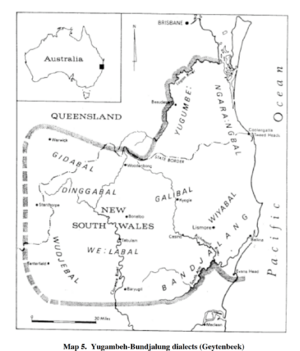Githabul language facts for kids
Quick facts for kids Githabul |
|
|---|---|
| Ethnicity | Githabul, Kalibal, Geynyan |
| Native speakers | 4 (2016 census)e25 |
| Language family |
Pama-Nyungan
|
| Dialects |
Githabul
Gullibul
Dinggabul
|
| AIATSIS | E14 Githabul |
Githabul is an Aboriginal language from Australia. It is also known by other names like Galibal and Dinggabal. People from the Githabul community speak this language. They live in parts of South Queensland and North-East New South Wales. In 2016, only four people were recorded as speaking Githabul.
Contents
What Does Githabul Mean?

The word githabul in the Githabul language means 'those who say githa'. The word githa means 'that's right'. This word is often used by the Githabul people to refer to themselves and their language.
The name Githabul usually refers to the language spoken around Woodenbong. But there were other ways of speaking it too:
- The southern version, spoken near Drake, was called Dinggabal. This means 'those who say dinga', where dinga also means 'that's right'.
- The eastern version, spoken near Kyogle by the Richmond River, was called Galibal. This means 'those who say gali', and gali means 'this'. This is different from how Githabul and Dinggabal speakers would say 'this', which was gale.
How Githabul Grammar Works
Like all languages, Githabul has its own rules for how words are put together. This is called grammar.
How Verbs Change
Verbs are action words, like 'run' or 'eat'. In Githabul, verbs change by adding small parts called suffixes to the end. English verbs mostly change to show when something happened (past, present, future). Githabul verbs mostly change to show how an action happens, like if it's still happening or if it's finished. This is called aspect.
Githabul verbs can have up to six suffixes added to them. These suffixes always attach in a specific order. This system allows for many different ways to express actions. Most Githabul verbs are two syllables long and always end with a vowel sound.
How Adjectives Change
Adjectives are words that describe nouns, like 'big' or 'red'. In Githabul, adjectives can also change by adding suffixes. These suffixes show the gender of the noun they are describing. Githabul has a very detailed system for genders, more than many other languages in its family.
For example, an adjective might have a different ending depending on whether it's describing a male person, a female person, or a tree.
Demonstrative Words
Githabul has a complex set of demonstrative words. These are words like 'this', 'that', and 'those over there'. They help you point out things.
Githabul has three main distances:
- Proximal: For things close to you (like 'this').
- Medial: For things a bit further away (like 'that').
- Distal: For things far away (like 'that over there').
There are also different types of demonstrative words:
- Adjective set: These describe nouns, like 'this book'. They can also be changed to become pronouns, like 'take this!'. These words also change depending on if the thing is in sight, hidden, or not there anymore.
- Location set: These tell you where something is, like 'here' or 'there'. They can also show if the place is a general area or a specific spot, and if it's in sight or not.
For example, to say 'this' (something close and in sight), you might use gale. If you want to say 'here' (a specific place in sight), you might use gaji.
See also
 In Spanish: Idioma githabul para niños
In Spanish: Idioma githabul para niños
 | Isaac Myers |
 | D. Hamilton Jackson |
 | A. Philip Randolph |

